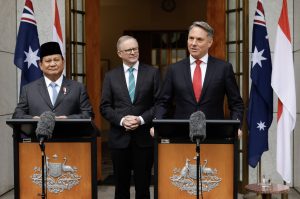The remaining five members of the Bali Nine drug trafficking ring have returned to Australia after nearly two decades in prison in Indonesia, under an arrangement with President Prabowo Subianto.
Scott Rush, Matthew Norman, Si-Yi Chen, Martin Stephens, and Michael Czugaj were among the nine Australians arrested in 2005 for attempting to smuggle 8.3 kilograms of heroin into Australia from the island of Bali. They are currently serving life sentences in Bali and Java.
In a statement, Prime Minister Anthony Albanese said that he was “pleased to confirm” that the five men touched down in Australia yesterday. “Wearing face masks and civilian clothes,” ABC News reported, “the men were made to pause at the base of the steps on the tarmac while Indonesian officials posed for photos with Australian counterparts.”
The five men have had the rest of their life sentences commuted on humanitarian grounds on the condition that they continue their rehabilitation in Australia. They are now free and have been provided with temporary accommodation during what will likely be a difficult period of reintegration into Australian society.
The two “ringleaders” of the Bali Nine, Andrew Chan and Myuran Sukumaran, the ringleaders of the “Bali Nine,” were executed in 2015. Of the remaining two members of the group, Tan Duc Than Nguyen died of cancer in June 2018, and the sole female member of the group, Renae Lawrence, was released and deported to Australia in November 2018.
In a statement released on their behalf by their lawyer, Julian McMahon, the group said that they were “immensely grateful” to Prabowo for approving their return home. They also thanked the successive Australian foreign ministers and governments that have advocated for their release, and said they were “relieved and happy to be back in Australia.”
“They look forward, in time, to reintegrating back into and contributing to society,” the statement said. “The welfare of the men is a priority, they will need time and support, and we hope the trust our media and community will make allowance for this.”
In his statement, Albanese said that the government “would like to convey our deep appreciation to the government of Indonesia for its cooperation to facilitate the men’s return to Australia on humanitarian grounds,” adding his thanks to Prabowo for his “act of compassion.”
Albanese raised the issue of their repatriation during a meeting with Indonesia’s President Prabowo Subianto on the sidelines of the APEC Summit in Peru in November, shortly after Prabowo’s inauguration.
“This reflects the strong bilateral relationship and mutual respect between Indonesia and Australia,” the ministers said in the statement. “The men will have the opportunity to continue their personal rehabilitation and reintegration in Australia.”
While the return of the Australian prisoners reportedly did not involve an explicit quid pro quo, Yusril Ihza Mahendra, Indonesia’s senior minister for legal affairs, said in a statement that the transfer was “reciprocal in nature.” This means, he said, that “if one day our government requests the transfer of Indonesian prisoners in Australia, the Australian Government is also obliged to consider it.” He added that the five men are banned for life from entering Indonesia.
The return of the Bali Nine came shortly before the expected return home of Mary Jane Veloso, a Filipino woman on death row for drug trafficking in a separate case, who would be allowed to serve the rest of her sentence in her home country. Veloso, now 39, has been on death row in Indonesia since her arrest for heroin trafficking in Yogyakarta in 2010.
The mother of two enjoyed a last-minute reprieve in 2015, when she was scheduled to be executed along with eight other drug convicts at Nusa Kambangan prison, including the two leaders of the Bali Nine. Indonesian and Philippine officials have expressed hopes that she will be back in the Philippines by Christmas. Indonesian officials have said that her return will also be “reciprocal in nature.”
After years of rebuffing requests for the repatriation of foreign drug convicts, Indonesia’s willingness to return Veloso and the Bali Nine to their countries of origin, and to accept the commutation of the latter’s sentences, suggests that Prabowo’s administration is taking a more lenient approach toward foreigners serving long prison sentences for drug-related offenses.
A clue for the shift in approach presented itself two days before the Australian prisoners flew home, when an Indonesian minister announced that 44,000 prisoners nationwide were set to be amnestied on humanitarian grounds in order to help relieve the country’s overcrowded jails. Those slated for release include people convicted in defamation and hate speech cases, including several activists from the restive Papua region, Law minister Supratman Andi Agtas said.
































